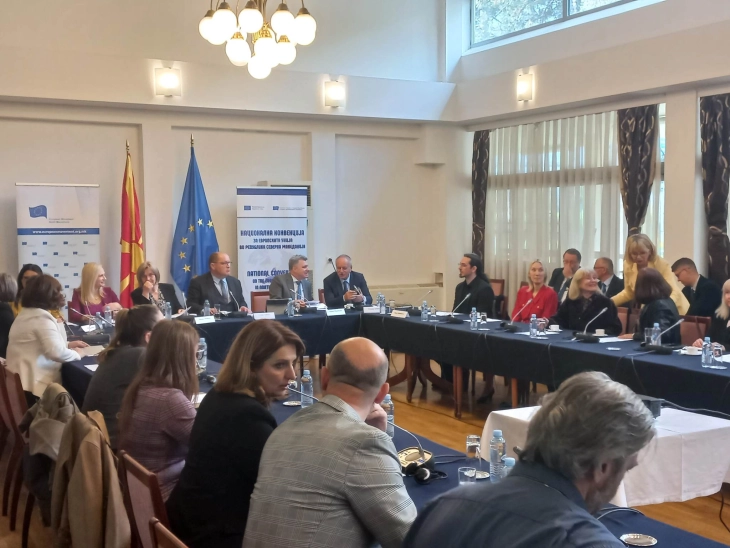NCEU-MK session: Low rating of judicial institutions in the country, citizens' support for EU membership declining
- The rating of judicial institutions in the country is quite low, and citizens' support for EU membership is also low, i.e. almost halved. The government's political will in this area is important, but it is necessary to move from a declarative political will to greater activities on the reform plan. Working group 3 is a good opportunity to see if the conclusions from the recommendations and from the session itself are relevant and reflect the reality of the country, said participants in Tuesday's 11th session of the Working Group 3: Judiciary and Fundamental Rights (Chapter 23) on regulation, pragmatic context and effects vis-à-vis Chapter 23 and state responsibility in administration of justice, hosted by the National Convention on the European Union in North Macedonia (NCEU-MK).
- Post By Nevenka Nikolik
- 14:10, 25 April, 2023

Skopje, 25 April 2023 (MIA) - The rating of judicial institutions in the country is quite low, and citizens' support for EU membership is also low, i.e. almost halved. The government's political will in this area is important, but it is necessary to move from a declarative political will to greater activities on the reform plan. Working group 3 is a good opportunity to see if the conclusions from the recommendations and from the session itself are relevant and reflect the reality of the country, said participants in Tuesday's 11th session of the Working Group 3: Judiciary and Fundamental Rights (Chapter 23) on regulation, pragmatic context and effects vis-à-vis Chapter 23 and state responsibility in administration of justice, hosted by the National Convention on the European Union in North Macedonia (NCEU-MK).
NCEU-MK national coordinator and president of the European movement, Mileva Gjurovska, pointed out that around 40 percent of the National Convention's recommendations are already implemented.
"In the past six years, NCEU created a special circle of experts, whose dialogues and recommendations were useful for the government sector," said Gjurovska, adding that the project National Convention for the European Union in North Macedonia is a good platform for the involvement of the civil sector in debates on topics related to the process of European integration, in order to prepare all the capacities of the state for the upcoming process of negotiations with the EU.
According to her, the rating of judicial institutions in the country is quite low.

"On the other hand, the percentage of citizens' support for EU membership is also low, and has significantly declined. From 80 percent support for the EU a decade ago, latest polls show that support is roughly 40 percent now. The political will shown by the government in this area is very important, but it is necessary to move from declarative political will to greater activities on the reform plan. The reform process should be in focus," said Gjurovska.
She added that the European space is saturated much more with political segments than with positive aspects of the European integration process itself.
According to her, the civil sector in our country is strong in terms of Chapter 23. She pointed out that we have several platforms operating here, but the remark about the civil sector is that this sector, as well as many institutional aspects in the country, are not connected to each other.
"There is no synergy between the civil associations that act in terms of European integration processes, and perhaps this convention would give a special contribution to encourage civil associations, to use this platform, as a platform where they will express their results, and there are many of them, but remain owned by the associations themselves," said Gjurovska.
President of the Council of Ambassadors, Muhamed Halili, also co-chair of Tuesday's session, told the opening of the expert part of the session that the country's legal system is full of nepotism, and this can affect the country very badly.

Professor at the Faculty of Law and expert at NCEU, Nikola Tupancheski, said the Working Group 3 was a good opportunity to see whether conclusions from the recommendations and from the session itself are relevant and present the reality of our country.
The session's debate included other experts from the area of law, judges, university professors, as well as civil society representatives relevant for this topic.







